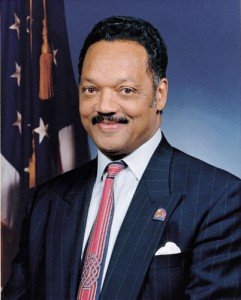Citizens Are Stepping Up to Help Puerto Rico -- The Government, Not So Much
Jesse Jackson | 10/20/2017, 6:49 a.m.
Millions of Americans still face perilous conditions in Puerto Rico. Three weeks after Hurricane Maria savaged the island, over 80 percent still have no electrical power. Forty percent are without running water. Millions are in dire need of food. Water purification systems can't work without electricity.
Gas stations have reopened, but the island's economy remains moribund. Only a few hundred miles of the island's 5,000 miles of road are open to traffic. Disease is spreading, with the health care system still in miserable condition. These are Americans in extreme distress. It is time to step up.
Last weekend, I joined religious leaders to deliver more than 150,000 pounds of food, water, medicine and generators supplied by volunteer donations in Chicago. FedEx CEO Fred Smith generously answered my call for help and, with COO David Bronczek and Senior Vice President Shannon Brown, arranged to supply the plane and flight crew, one of more than 70 relief flights FedEx has sponsored.
From across America, nurses, firefighters, church groups, unions, athletes and entertainers have donated time, energy and resources to their fellow citizens in Puerto Rico.
But a crisis this severe requires a massive governmental response, and the reaction of FEMA, the Federal Emergency Management Agency, has been admittedly slow and inadequate. Americans on the island face a horrible food crisis. As the Guardian reported, FEMA officials admit they are supplying 200,000 meals a day to meet the daily food requirements of 2 million people. That's a shortfall of nearly 2 million meals daily. Americans without electricity, their homes destroyed, struggle to find clean water and minimal food. That is a recipe for disease, with children and the elderly and the sick most at risk.
Donald Trump has treated the crisis mostly as a public relations problem. He slurred the Mayor of San Juan as "weak" when she begged for assistance because people were dying. He suggested that the island's residents want "everything to be done for them." He threatened an early departure of FEMA and the military, and boasted about what has been a shameful response: "Nobody could have done what I've done for #PuertoRico with so little appreciation," he tweeted.
But this isn't a public relations problem for the president; it is a human crisis for millions of American citizens. It can't be addressed in tweets and stunts. Real action is needed. In conjunction with FEMA, the U.S. military has finally begun to deploy the troops and helicopters needed to clear roads and supply emergency food and water. And, contrary to Trump's jibe, the general in command, Army Lt. Gen. Jeffrey Buchanan, reported that the island's residents have responded valiantly: "Communities are very tight and family is very important," he reported, "Everywhere I go I see neighbors out helping neighbors. That's what it is going to take to help this island get back on its feet."
In my discussions with them, San Juan Mayor Carmen Yulin Cruz and Governor Ricardo A. Rossello were forceful and clear about what was needed now. The immediate need is still for supplies that will sustain life -- water, food, medicine and generators. Solar installations to run water-filtering systems are essential while the electrical grid is rebuilt, a process that will take months.
Second, the mayor called for waiving the Jones Act at least for a year. The Jones Act requires that U.S. merchants deliver shipments to Puerto Rico. Countries across the world from South Africa to Mexico have volunteered to ship in emergency supplies. The Trump administration waived the act for 10 days. It should be waived at least until the emergency is over.
Third, the mayor needs accelerated visa procedures for those who are volunteering from across the hemisphere and the world to help rebuild the country. At the same time, arrangements should be made to evacuate the sick to hospitals on the mainland, and to move children so they will not lose a year of school. This was done in New Orleans after Katrina and in Texas after Harvey, and Puerto Rico should be no different.
Beyond immediate relief, the larger question is how Puerto Rico can rebuild. Even before the hurricane, the country was in the midst of a dire debt crisis and suffering severe austerity under the grip of a fiscal control board that creditors had elevated above the elected officials. Obviously, the previous agreements on debt repayment have to be revised now that Puerto Rico's economy has collapsed. The debt should be renegotiated and dramatically reduced, if not forgiven; creditors should bear part of the loss.
In the end, Americans in Puerto Rico need what Americans in Louisiana, Texas and Florida need: a long-term recovery package. Public investment to rebuild the sinews of the economy -- roads, bridges, water systems, the electric grid, hospitals and schools -- will put people to work and kick-start the economy. As we witnessed with Europe after the devastation of World War II, massive aid for rebuilding will generate jobs and growth.
The Americans living in Puerto Rico have little political clout. They can't vote in presidential elections. They are, however, American citizens, not second-class citizens. They should not suffer second-class treatment. Across the country, Americans have responded generously to the crisis in Puerto Rico. Now it is time for Washington to step up.
You can write to the Rev. Jesse Jackson in care of this newspaper or by email at jjackson@rainbowpush.org. Follow him on Twitter @RevJJackson.
Share this story online at stylemagazine.com.




